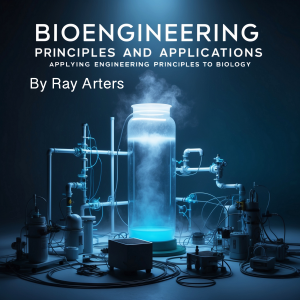

Bioengineering
Ray Arters
This audiobook is narrated by a digital voice.
Bioengineering stands at the fascinating intersection where the precision of engineering meets the complexity of biological systems. This interdisciplinary field represents humanity's ambitious attempt to understand, modify, and harness the power of living organisms for technological advancement and human benefit. From designing artificial organs to programming bacteria to produce life-saving medicines, bioengineering transforms both our understanding of life and our ability to improve it.
The roots of bioengineering can be traced back to ancient civilizations that used fermentation to produce bread, wine, and cheese. However, the modern discipline emerged in the mid-20th century when engineers began applying quantitative methods and systematic approaches to biological problems. The development of sophisticated instrumentation, computational power, and molecular biology techniques created unprecedented opportunities to analyze and manipulate biological systems with engineering precision.
At its core, bioengineering applies engineering principles such as design, analysis, optimization, and control to biological systems. Unlike traditional engineering disciplines that work with predictable materials like steel and silicon, bioengineers must contend with the inherent variability and complexity of living systems. Biological materials are self-assembling, self-repairing, and adaptive, properties that present both challenges and opportunities for engineering applications.
Duration - 56m.
Author - Ray Arters.
Narrator - Digital Voice Archie G.
Published Date - Saturday, 18 January 2025.
Copyright - © 2025 Ray Arters ©.
Location:
United States
Description:
This audiobook is narrated by a digital voice. Bioengineering stands at the fascinating intersection where the precision of engineering meets the complexity of biological systems. This interdisciplinary field represents humanity's ambitious attempt to understand, modify, and harness the power of living organisms for technological advancement and human benefit. From designing artificial organs to programming bacteria to produce life-saving medicines, bioengineering transforms both our understanding of life and our ability to improve it. The roots of bioengineering can be traced back to ancient civilizations that used fermentation to produce bread, wine, and cheese. However, the modern discipline emerged in the mid-20th century when engineers began applying quantitative methods and systematic approaches to biological problems. The development of sophisticated instrumentation, computational power, and molecular biology techniques created unprecedented opportunities to analyze and manipulate biological systems with engineering precision. At its core, bioengineering applies engineering principles such as design, analysis, optimization, and control to biological systems. Unlike traditional engineering disciplines that work with predictable materials like steel and silicon, bioengineers must contend with the inherent variability and complexity of living systems. Biological materials are self-assembling, self-repairing, and adaptive, properties that present both challenges and opportunities for engineering applications. Duration - 56m. Author - Ray Arters. Narrator - Digital Voice Archie G. Published Date - Saturday, 18 January 2025. Copyright - © 2025 Ray Arters ©.
Language:
English
Start
Duration:00:56:50